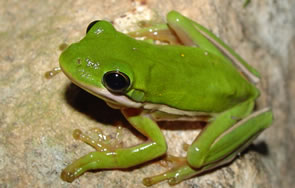
Green Treefrog
Hyla cinerea
Photo by Aubrey Heupel
Description: The green treefrog is relatively large, slender and usually bright green (but sometimes olive or brownish) with large toe pads and a white belly. Most individuals have scattered orange or gold flecks on their backs and a clearly defined ivory or yellow stripe along their upper jaws and their sides.
Habitats and Habits: Although their range is expanding into many parts of the Piedmont, green treefrogs are found primarily in the Coastal Plain, where they can be extremely abundant along wetland margins and in swamps. During the day, green treefrogs hide under waterside vegetation or in other moist, shady areas. At night, they forage for flying insects, often performing acrobatic maneuvers as they jump from branch to branch. Egg masses are attached to vegetation at or near the water’s surface. Tadpoles transform in about eight weeks.
Call: Green treefrogs breed from April to September. During the breeding season, their loud, monotonic, nasal “queenk, queenk, queenk” call can be heard from a wide variety of wetland habitats, from lake and river margins to ephemeral pools. From a distance, large congregations of green treefrogs sound like cowbells ringing.
Frog Fact: Herpetologists have found that this species and other treefrogs will occupy plastic PVC pipes that are placed around wetlands. This method has been used to monitor populations of treefrogs in North Carolina.
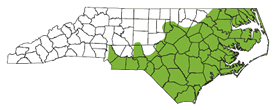
The shaded region represents the range of the green treefrog in North Carolina.
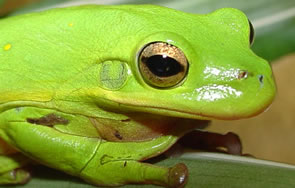
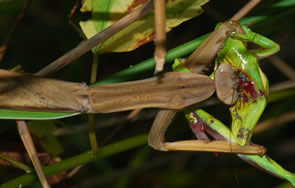
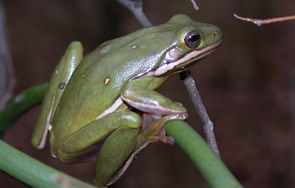
Photo by Aubrey Heupel
Green treefrog being preyed on by a praying
mantis.
Photo by John McKay
Photo by JD Willson
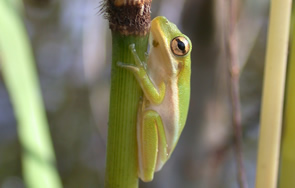
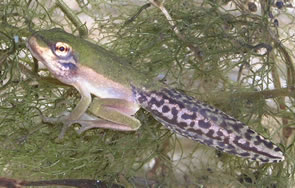
Photo by JD Willson
Photo by RW Van Devender
This website created by: Grant Connette and Evan Eskew.
For comments or questions contact M. Dorcas: midorcas@davidson.edu.
M. Dorcas homepage: http://bio.davidson.edu/dorcas
Davidson College, Davidson, North Carolina 28035-1719.
Text and maps from: Dorcas, M. E., S. J. Price, J. C Beane, and S. S. Cross. 2007. The Frogs and Toads of North Carolina. North Carolina Wildlife Resources Commission, Raleigh, NC. – Copyright by Michael E. Dorcas
Partial Funding for this website provided by a Associate Colleges of the South, National Science Foundation, and Duke Energy.
